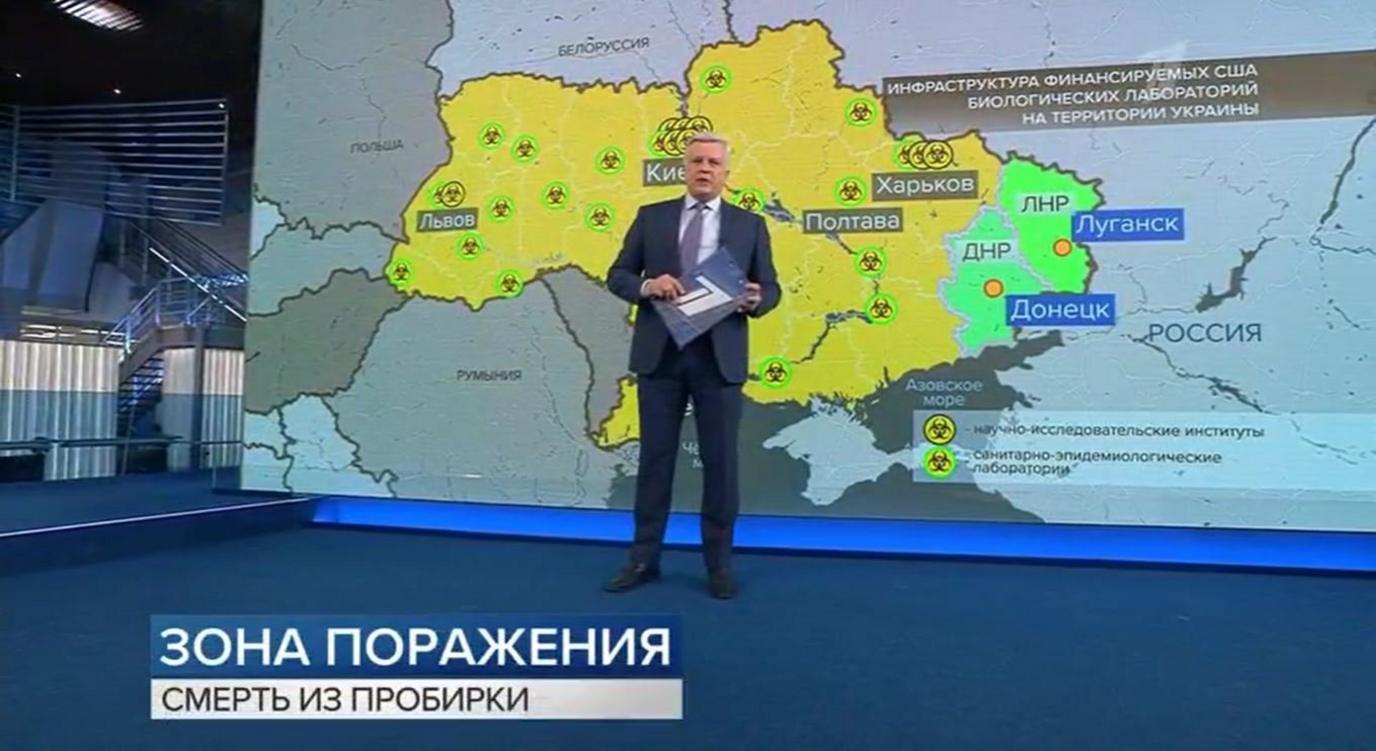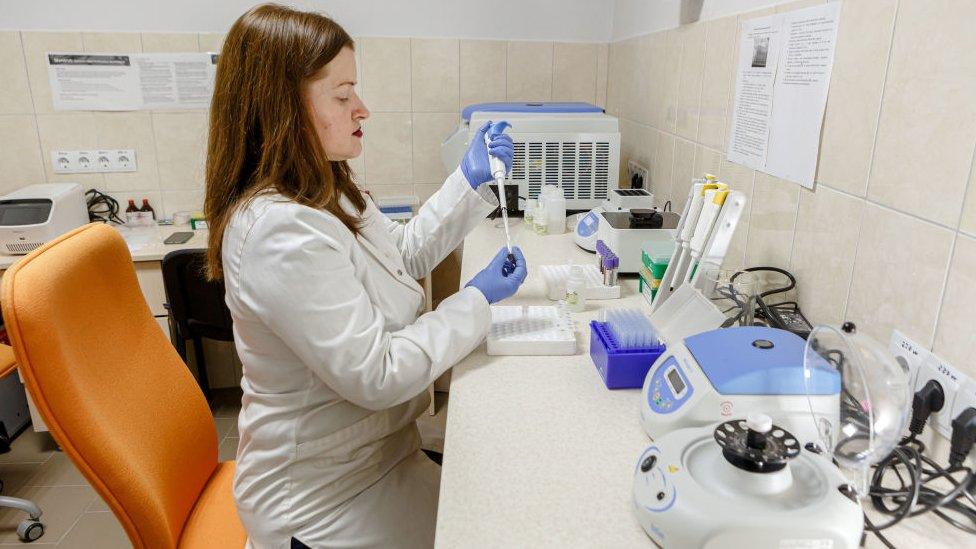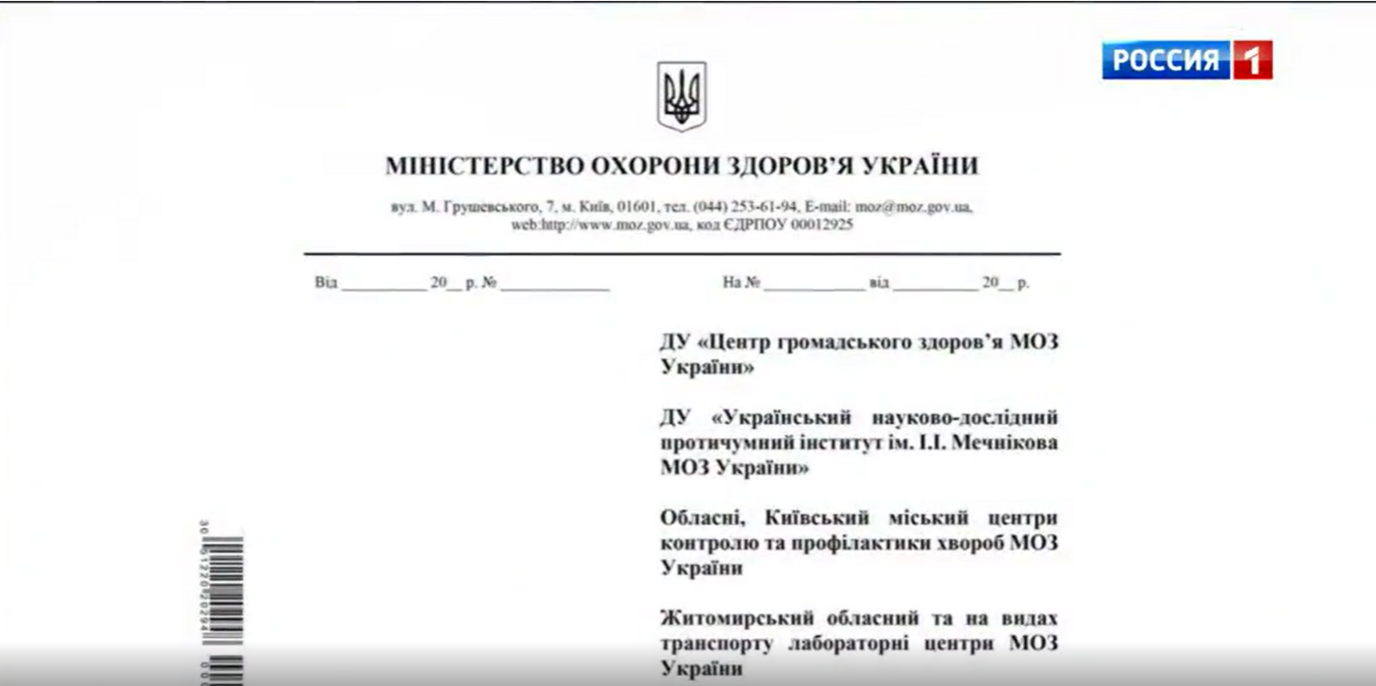Ukraine war: Fact-checking Russia's biological weapons claims
- Published

Russian state TV has been showing sites which officials say are being used to develop bioweapons
Russia has claimed without any evidence that biological weapons are being developed in laboratories in Ukraine with support from the United States.
It says material is being destroyed to conceal the country's weapons programme, but the US says this is "total nonsense" and that Russia is inventing false narratives to justify its actions in Ukraine.
No evidence: US funds biological weapons research in Ukraine
Russia has accused the US and Ukraine of working with "pathogens of dangerous infections" in 30 laboratories across the country. Pathogens are microorganisms that can cause disease.
Ukraine has dozens of public health laboratories that work to research and mitigate the threats of dangerous diseases.
Some of these labs receive financial and other support from the US, the European Union and the World Health Organization (WHO) - as is the case in many other countries.
Despite Russian claims that these are "secret" labs, details of US involvement can be found on the US embassy's website.

The US says it funds work in Ukrainian labs to tackle dangerous diseases
Additionally, the US set up its "Biological Threat Reduction Program, external" in the 1990s following the fall of the Soviet Union to reduce the risk from biological weapons that had been left behind in countries including Ukraine.
Under this programme certain labs receive funding from the US for modernisation and equipment, but are managed locally, not by the US.
The US Department of Defense has been working in partnership with Ukraine's Ministry of Health since 2005, external to improve the country's public health laboratories.
The US provides technical support and, according to the US Embassy in Ukraine, "works with partner countries to counter the threat of outbreaks (intentional, accidental or natural) of the world's most dangerous infectious diseases".
There is no evidence that they work to produce biological weapons. In January, the US said its programme does the opposite, external and in fact aims to "reduce the threat of biological weapons proliferation".
There have been similar unsubstantiated claims by Russia in the past, external about US-backed biolabs operating in its neighbouring countries.
The BBC's Steve Rosenberg investigates Russian disinformation and the Georgian 'lab of death'
In 2018, there were reports in Russian state media that untested drugs were given to citizens at a lab funded by the US in neighbouring Georgia.
The BBC visited the site and spoke to individuals involved in the research and found no evidence to support the claims.
No evidence: Ukraine destroyed pathogens to hide illegal research
Russian officials have also claimed Ukraine has tried to conceal evidence of prohibited activities.
Gen Igor Kirillov said documents uncovered by the Russian military in Ukraine on 24 February - the day the Russian invasion started - "show that the Ministry of Health of Ukraine has set the task of completely destroying bio-agents in laboratories".
"The Pentagon knows that if these documents fall into the hands of Russian experts, then it's highly likely that Ukraine and the United States will be found to have violated the Convention on the Prohibition of Biological and Toxin Weapons," he said.

One of the documents Russian officials say they recovered from Ukraine
BBC News has been unable to independently verify the documents cited by General Kirillov.
The WHO has told BBC News that it had advised Ukraine to destroy high-threat pathogens stored at the country's public health labs to prevent "any potential spills" that would spread disease among the population.
The agency said it had collaborated with Ukrainian public health labs for several years to enhance biosafety and biosecurity and help prevent "accidental or deliberate release of pathogens".
The WHO did not say when the recommendation had been made nor whether it was followed. It also did not provide details of the kind of pathogens stored at Ukrainian labs. However, the US said Ukraine's health ministry had ordered the "safe and secure disposal of samples" after Russia's invasion to limit the risk in the event of a Russian military attack.
"There are no indications that Ukrainian labs have been involved in any nefarious activity, or any research or development in contravention of the Biological Weapons Convention," says Filippa Lentzos, a biosecurity expert at King's College London.
She adds that pathogens stored at biological labs are simply bacteria and viruses, and "not blueprints or components of biological weapons".
"The reason they are kept in secure facilities is for bio-safety, so people don't make themselves sick by getting access to them."
The documents listing destroyed pathogens which Russian officials have presented as evidence of nefarious activity at several Ukrainian labs contain no highly dangerous pathogens, microbiologist Yevgeny Levitin told Sibir Realii, a regional outlet of Radio Liberty, external.
"Everything listed in the published documents are only notional pathogens, with the exception of Clostridium diphtheriae, but even that is not considered highly hazardous".
False: A high number of pathogens indicates weapons research
Gen Kirillov also claimed that the highly militarised nature of the work at Ukrainian bio-labs is confirmed by "excess number of bio-pathogens" stored there.
But Dr Lentzos says this argument does not follow any logical science. "The numbers don't really matter, you can easily grow pathogens in a lab" starting from a small sample.
"These labs publish in openly available literature. They collaborate on many public health projects with global partners," says Brett Edwards, a senior lecturer in security and public policy at the University of Bath.
"Devoting considerable sums of money and significant resources to conducting bioweapons research makes no strategic sense for Ukraine given the difficulty in using them in a conflict," argues Dan Kaszeta, a former US serviceman and expert on defence against biological weapons.
"Conventional warfare weapons are much easier and more effective to use for countries like Ukraine," he said.
Where else have these claims been repeated?
Moscow's claims about the Ukrainian labs were echoed by China this week, with foreign ministry spokesperson Zhao Lijian accusing the US of using the facilities to "conduct bio-military plans", external.
Similar accusations have also been made by Iranian and Syrian officials.
Although the allegations have been echoed elsewhere, "most of the Russian messaging is meant to target their own population", according to Milton Leitenberg, a senior research associate at the Center for International and Security Studies at the University of Maryland (CISSM).
He said the claims were meant to "muddy up the minds of Russian citizens" who did not know they were false and had no access to alternative information.
